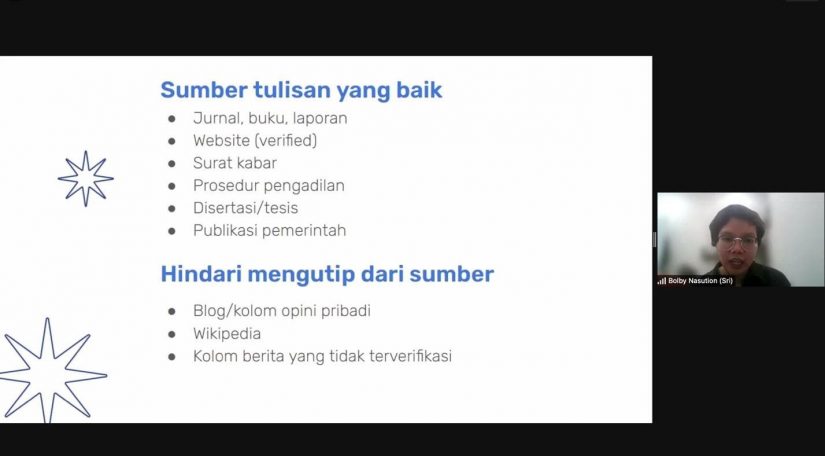
Yogyakarta, October 26th 2021─The Academic Innovation Unit of FISIPOL UGM held a Student Workshop program with the theme “References and Citations in Academic Writing” on Tuesday (26/10) afternoon. This event invited speaker Sri Handayani Nasution, project officer of the CfDS of UGM’s research division.
As a student, citations are important to know in academic writing. A citation is a reference or citation that allows us to acknowledge the sources that have been cited. Citation is useful for verifying the data obtained so that our writing can be accounted for and has accountability. The form of citations can be in the form of body text and footnotes. While the variety of citation styles that are quite familiar are APA style and MLA style.
The reason citations are important is because the ideas/ideas/arguments we quote are currency in academia. “So, academics will be happy to accumulate this currency, when they are sourced or cited with more meaning that their writing is considered credible and the ideas are still relevant,” Sri Handayani said. In addition, if we do not include the source in the writing of the ideas or arguments we take, it means that we have violated the rights of the author. Sri said that including sources when taking ideas from other people’s publications is a writing ethic so as not to get caught up in plagiarism. Citation is also used for tracking the needs of academic writing sources.
“The purpose of tracking is when we want to strengthen or reuse other people’s theories and to review, review, disprove other people’s theories/arguments, citations are useful there so we know where the theory originally came from,” Sri Handayani said.
Although we are obliged to include citations in writing, not all statements must be citations. An example is when things are considered normal and common. Some that must be cited are when citing opinions/ideas/ideas from other sources, taking data, and taking theories used by other authors. While good sources of writing for citations include: journals, books, reports; website (verified); newspaper; court procedures; dissertation/thesis; and government publications. In listing sources, we need to avoid blogs/personal opinion columns, wikipedia, and unverified news columns because they are not considered credible and cannot be accounted for.
